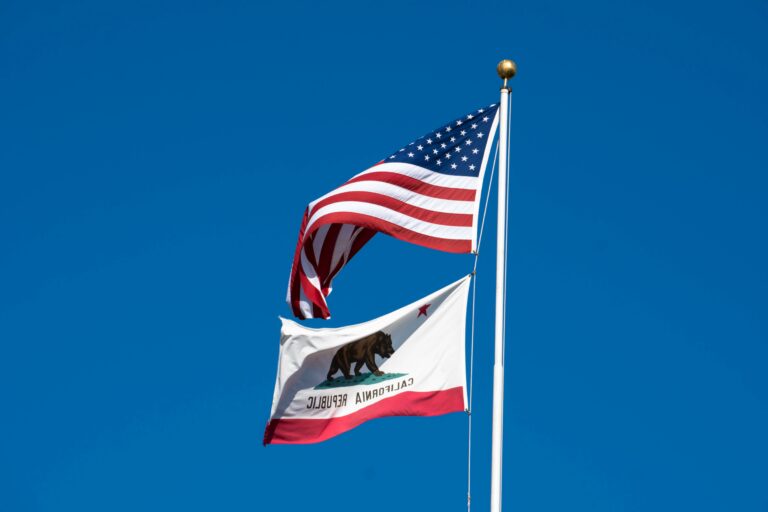California lawmakers just passed a law that will have an extraordinary chilling effect on Second Amendment rights—and it has received hardly any discussion.
The state’s latest move should scare anyone concerned about protecting the constitutional right to keep and bear arms. The measure can be found toward the end of SB-1327, which both houses of the California legislature recently passed. It awaits Democratic Governor Gavin Newsome’s signature. The goal? To block court challenges to California’s gun laws.
The dry, legalistic language obscures the significance: “Notwithstanding any other law, any person, including an entity, attorney, or law firm, who seeks declaratory or injunctive relief to prevent [California, local governments, or government officials] from enforcing any statute, ordinance, rule, regulation, or any other type of law that regulates or restricts firearms, or that represents any litigant seeking that relief, is jointly and severally liable to pay the attorney’s fees and costs of the prevailing party.”
What does this mean in plain English? If you challenge California’s gun-rights restrictions in court and lose any aspect of the lawsuit, you will be held liable for paying all of the government’s legal fees and costs.
This is a huge matter because the First Amendment affirms the right to “petition the Government for a redress of grievances,” and for more than 150 years, federal law has allowed plaintiffs to sue any level of government (federal, state, or local) for violations of constitutional rights. That is why so many civil rights protections have arisen from court challenges. Think of landmark cases involving free speech, equal protection, and voting rights.
Second Amendment rights, too. Only last month, the Supreme Court affirmed the individual’s right to carry firearms outside the home, all because the New York State Rifle and Pistol Association challenged New York State’s restrictive gun-carry law in court.
That is exactly the kind of case California is trying to thwart.
California’s new legislation discriminates against Second Amendment rights. The bill does not apply to any other aspect of the Constitution. It singles out challenges to any “law that regulates or restricts firearms.” Could you imagine if a state passed a law holding plaintiffs and attorneys financially responsible if they lost a court challenge to a “law that regulates or restricts voting rights or free speech rights”?
The language of California’s law becomes especially dangerous when it says that if a court “dismisses any claim or cause of action brought by the party seeking the declaratory or injunctive relief” or enters judgment for the government on any claim, the government is the “prevailing party” and is entitled to collect attorneys’ fees from the plaintiffs. In other words, if any part of the plaintiffs’ case goes away, those plaintiffs will need to pay up.
But it is common for plaintiffs’ attorneys to present multiple claims in a single case. If the court dismisses some of their claims but still strikes down the law in question as unconstitutional, the plaintiffs are satisfied. But now California is saying that if plaintiffs lose any aspect of their case, they will owe the government legal fees—even if the court strikes down the law!
In civil rights cases, it is routine for courts to decide the case based on one issue, granting victory to the plaintiffs, and to dismiss other claims as unnecessary. Under that scenario, it appears that the defendant–even though it lost the case–is nonetheless a prevailing party because the court “dismis[ed] any claim or cause of action brought by the party seeking the declaratory or injunctive relief.” Even if the plaintiff’s claim was not dismissed on the merits, the defendant is the one who collects attorney’s fees.
Think about the consequences of this law. Whether you are an individual, a nonprofit organization, or a business, you will be on the hook financially if you bring a case challenging a California gun law and don’t win on every claim. Attorneys’ fees in extended constitutional litigation can be huge, running into millions of dollars.
It is highly unusual for the government to be awarded attorneys’ fees in such litigation. It is unheard of to make the plaintiffs’ lawyers responsible for paying the government’s legal fees (unless the lawyers brought an obviously frivolous claim). But California’s bill does just that.
California claims to be motivated to enact this law because of a similar one in Texas that applies to abortion challenges. Even if true, that doesn’t make the law any better. Both the Texas law they mention, and the California law are infringements on Americans’ right to challenge unconstitutional policies.
Why would any individual, gun-rights advocacy group, or lawyer take on the risk of financial ruin to challenge California’s restrictive gun laws?
It gets worse. Normally, in cases that allow the shifting of attorneys’ fees, the court in which a case is tried either awards or denies the fees. But California’s statute says that the prevailing party can bring a separate lawsuit to obtain attorneys’ fees up to three years after the case ends. Because most Second Amendment litigation is brought in federal court, this language allows California to make an end run around the federal courts. California can bring a lawsuit in its own friendly state courts, bypassing the federal court that had initial jurisdiction over the underlying matter.
Then there is this: California’s new bill says that if the government sues to claim attorneys’ fees, the parties being sued cannot defend themselves even if the “court in the underlying action held that any provision of this section is invalid, unconstitutional, or preempted by federal law.” That is to say; it will not matter if a federal court holds that this new California law is unconstitutional. The state can still hold plaintiffs liable for its legal fees. This California provision flies in the face of the U.S. Constitution’s Supremacy Clause—and common sense.
And for the final blow, California’s statute ends with these words: “Any person, including an entity, attorney, or law firm, who seeks declaratory or injunctive relief . . . shall not be deemed a prevailing party under this section or any other provision of this chapter.” In other words, the people challenging a California gun law always lose. They can never be awarded attorneys’ fees.
This new law is a blatant attempt to stop people from challenging California’s oppressive firearms laws. It is likely unconstitutional. But will someone be willing to challenge it in court? And even if so, how long will it take for the legal process to play out?
California’s move may also be a sign of things to come from other deep blue states. Now that the Supreme Court has reaffirmed the Second Amendment right to keep and bear arms, expect to see many more frenzied efforts to curtail gun rights by any means, fair or foul.








6 Responses
I’m not a lawyer, but I wonder if this would work:
-A pro-gun state passes something that operates similarly to what California is trying to do to stack the legal deck in their favor. That “something” would be extremely niche and unrelated to guns so it wouldn’t actually violate anyone’s rights in practice.
-An organization then challenges *that* law all the way up to the Supreme Court, where it rightfully gets tossed out.
-At that point California’s approach could be ruled unconstitutional without ever having to sue within it’s borders.
Could that possibly work?
Possibly. There’s a Texas law dealing with abortion that has a similar provision. So, this is likely to be challenged from several places at once.
“Notwithstanding any other law, any person, including an entity, attorney, or law firm, who seeks declaratory or injunctive relief to prevent [California, local governments, or government officials] from enforcing any statute, ordinance, rule, regulation, or any other type of law that regulates or restricts firearms, or that represents any litigant seeking that relief, is jointly and severally liable to pay the attorney’s fees and costs of the prevailing party.”
A legal challenge against this part of the law would not meet the conditions of the statue. The first lawsuit against this provision would not be against enforcement of a firearms statute. It would be against this provision only. It would be about lawsuits and responsibility not about firearms law.
Interesting reading. That could be the case. It’s always a bit hard to tell with these novel laws.
Thanks for publicizing this aspect of California’s recently-enacted SB 1327. Most of the existing commentary on this legislation ignores the fact that every act over which it creates a private right of action is already a crime in California. Lots of people either don’t understand California’s gun laws—or they believe that it’s worse to face a civil suit than a decade in San Quentin.
Regarding the fee shifting provisions of SB 1327, aren’t these limited to actions in state courts? As the vast majority of Second Amendment litigation is brought in federal courts, when awarding fees and costs doesn’t 42 U.S. Code § 1988 apply exclusively?
I’m wondering the same thing now that you mentioned that.
It seems like Newsome is trying to insulate California from the Bill of Rights as much as he can, but I’d be surprised if there were no workarounds.